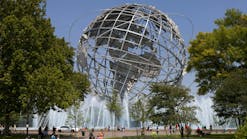Research Finds Salting Roads Impacts Freshwater Ecosystems
William Hintz, an assistant professor in the University of Toledo’s Department of Environmental Sciences, recently researched the deicing salt Americans use for roads and its relation to the survival of freshwater ecosystems.
The findings were published in the journal Proceedings of the National Academy of Sciences.
According to the research, the buildup of salt (especially in freshwater ecosystems), which come from humans’ agricultural and mining activities, deicing salt operations, and more, impacts freshwater systems, reported Inverse News.
Humans are dependent on freshwater ecosystems for drinking water. The Great Lakes on the Canada-U.S. border provide drinking water for more than 40 million Americans, reported Inverse News.
“We — as a society — need to recognize that salt pollution is a major ecological issue affecting our freshwater ecosystems,” Hintz added, reported Inverse News. “We all need fresh water.”
Hintz studied human-induced salinization across freshwater lake ecosystems throughout North America. The research shows that this human-induced salinization substantially impacts zooplankton populations in lakes across North America, reported Inverse News.
Mortality increased even in lakes where chloride levels are at or below acceptable thresholds according to U.S. and Canadian laws. Additionally, in more than 70% of the lake sites studied where significant zooplankton mortality occurred, chloride levels did not exceed the legal limit, which the acceptable levels of chloride in the U.S. and Canada are 230 milligrams of chloride per liter and 120 milligrams of chloride per liter.
Europe does not have standardized freshwater chloride limits. Germany classifies water containing 50 to 200 milligrams as only slightly polluted by salt, reported Inverse News. Drinking water limits are around 250 milligrams per liter across EU nations.
The death of zooplankton causes effects that impact lake ecosystems, including a large increase in phytoplankton. The researchers conclude that human-induced salinization of freshwater lakes could trigger a significant loss in zooplankton diversity, ultimately impacting lake food webs.
Once salinization kills off the zooplankton, this could trigger reductions in both fish growth and population, and more algae, blocking sunlight for lake ecosystems and affecting water quality.
“We — as a society — need to recognize that salt pollution is a major ecological issue affecting our freshwater ecosystems,” Hintz added, reported Inverse News. “We all need fresh water.”
Water from lakes in the U.S., Canada, and Europe were used. Researchers tested how microorganisms respond to elevated salt levels and scientists conducted 16 different experiments in mesocosms. According to the research, current regulations are insufficient to protect widespread salinization from harming lake ecosystems.






